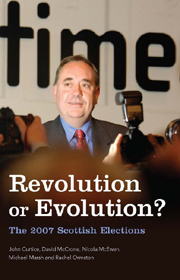Book contents
- Frontmatter
- Contents
- List of Tables
- Preface
- CHAPTER 1 A Watershed Election?
- CHAPTER 2 A Distinctive Scottish Voice? Identities, Values and Attitudes
- CHAPTER 3 What has Devolution Achieved? The Public's View
- CHAPTER 4 Governing Scotland: The People's Preferences?
- CHAPTER 5 Lost Labour Votes? Records, Personalities and Issues
- CHAPTER 6 How the SNP Won
- CHAPTER 7 Do Voters Care about Parties Any More?
- CHAPTER 8 A Personal Vote? How Voters Used the STV Ballot
- CHAPTER 9 Conclusion
- Technical Appendix
- Index
CHAPTER 2 - A Distinctive Scottish Voice? Identities, Values and Attitudes
Published online by Cambridge University Press: 12 September 2012
- Frontmatter
- Contents
- List of Tables
- Preface
- CHAPTER 1 A Watershed Election?
- CHAPTER 2 A Distinctive Scottish Voice? Identities, Values and Attitudes
- CHAPTER 3 What has Devolution Achieved? The Public's View
- CHAPTER 4 Governing Scotland: The People's Preferences?
- CHAPTER 5 Lost Labour Votes? Records, Personalities and Issues
- CHAPTER 6 How the SNP Won
- CHAPTER 7 Do Voters Care about Parties Any More?
- CHAPTER 8 A Personal Vote? How Voters Used the STV Ballot
- CHAPTER 9 Conclusion
- Technical Appendix
- Index
Summary
Establishing the Scottish Parliament was always potentially a risky enterprise for those who wanted to maintain the Union between Scotland and England. There were at least two key ways in which its possible impact on public opinion north of the border might undermine the link between the two countries. First, the creation of distinctive political institutions that recognised and symbolised Scotland's nationhood might stimulate and encourage people in Scotland to feel Scottish rather than British. And if people's sense of British national identity were to be eroded, then so also might be their wish to have that identity recognised through Scotland's continued membership of the United Kingdom (Thatcher, 1998). Second, the establishment of a separate forum for political debate and decision-making in Scotland would seem to make it more likely that public opinion in the country would diverge from that elsewhere in the United Kingdom. After all, people in Scotland would debate policy issues amongst themselves without being influenced any more by those living in England, while the government in Scotland could implement and promote policies that were very different from those being pursued in England. Once people in Scotland realised they had a different set of priorities from those living in England, they would increasingly chafe at the remaining restrictions that membership of the Union imposed on their ability to decide policy for themselves (Curtice, 2005).
Advocates of devolution had, of course, a riposte to these arguments. They suggested that, in the absence of devolution, support for the Union was being undermined because of its failure to recognise the distinctive public opinion that already existed in Scotland.
- Type
- Chapter
- Information
- Revolution or Evolution?The 2007 Scottish Elections, pp. 17 - 41Publisher: Edinburgh University PressPrint publication year: 2009



